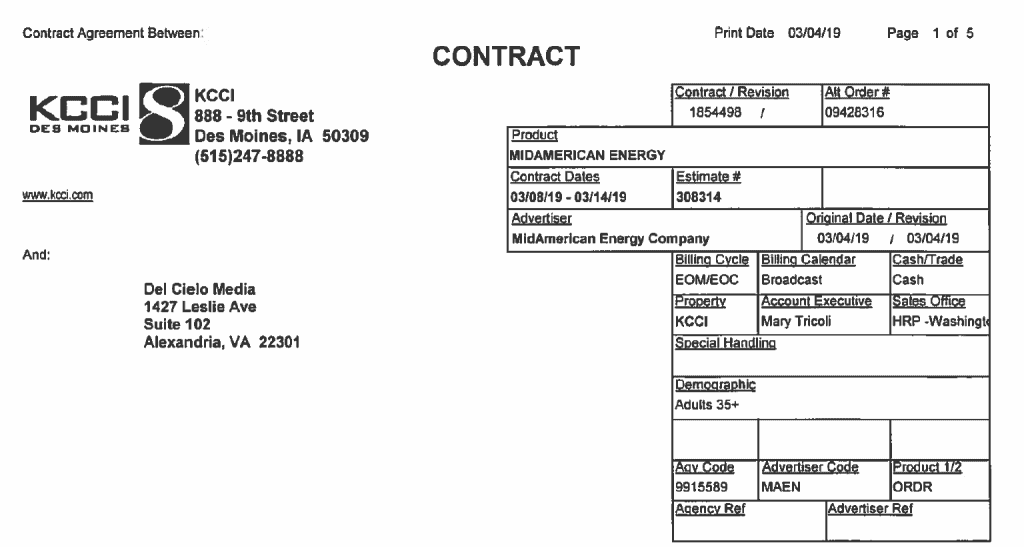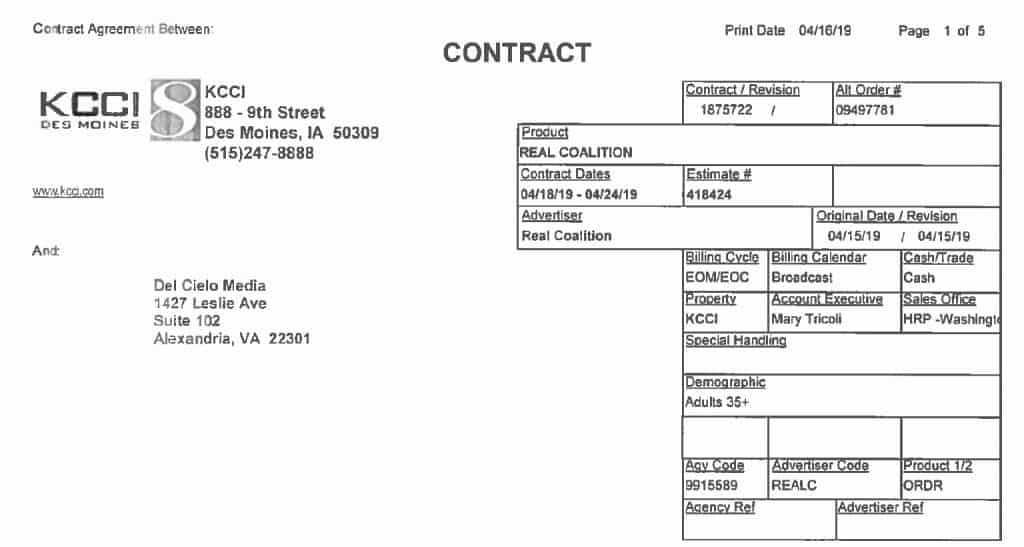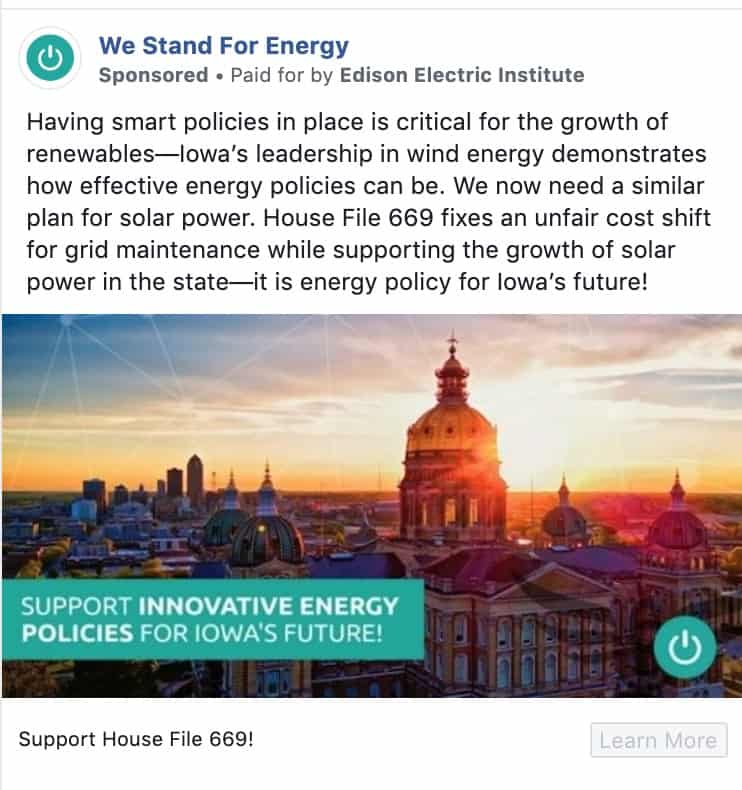Documents filed with the Federal Communications Commission may help solve the mystery of who is behind the REAL Coalition, a pro-utility front group which has opposed a solar-friendly policy in Iowa but never disclosed its backers. The documents show the REAL Coalition used the same ad buying agency and ad buyer who has purchased the commercial time for MidAmerican Energy, Iowa’s largest utility.
Issue ad disclosures by multiple Iowa television stations for both the REAL Coalition and MidAmerican, named Rande Levine of the Alexandria, Virginia based company Del Cielo Media, a subsidiary of the Smart Media Group, as the ad buyer. The forms are filed with the FCC by TV stations.


The REAL Coalition emerged in early March to advocate for utility-backed legislation that would have added additional fees on solar customers. The legislation, SF583/HF669 and referred to as the SOLAR Act, passed the Senate but officially died in the House when the legislative session ended on Saturday.
For years, utilities across the country have lobbied policymakers under the notion that solar customers cause a “cost-shift” to non-solar customers which must be immediately corrected through additional fees or charges on the rooftop solar customers. Multiple studies, however, have shown that solar customers provide more benefits than costs to all electric customers, and a 2017 report from the Lawrence Berkeley National Lab offered the latest evidence that the utilities’ cost shift argument is, for the most part, a self-serving myth.
The FCC documents further detail how a Des Moines television station, KCCI, asked the REAL Coalition to list its board members so that it could complete the National Association of Broadcasters (NAB) political disclosure forms, but the front group stonewalled the station’s inquiry.
Last fall, the Iowa Utilities Association, whose members include MidAmerican Energy and Alliant Energy, also purchased advertisements through Del Cielo Media. The trade group (perhaps mistakenly) attached members of the regulatory agency Iowa Utilities Board instead of its own board of directors.
The REAL Coalition was incorporated in January by trial attorney Steven Wandro of Wandro & Associates at 2501 Grand Avenue, Des Moines, IA. MidAmerican Energy did not answer questions about its role with the group when asked by Midwest Energy News in March. Wandro said another attorney at his firm completed the registration documents.
Josh Mandelbaum, a lawyer with the Environmental Law & Policy Center, told the outlet, “This group didn’t exist until the utilities, particularly MidAmerican, started pushing a bill that would decimate the distributed solar industry in Iowa.”
An Energy and Policy Institute review of NAB forms also finds that MidAmerican stopped running advertisements in Iowa around the same time the REAL Coalition’s campaign began.
The advertisements blanketed television stations for weeks, and the front group also spent over $11,000 on Facebook advertisements since March 1.
The Edison Electric Institute, the trade association for investor-owned utilities like Iowa’s MidAmerican Energy and Alliant Energy, also spent money on Facebook advertisements that advocated for the passage of the SOLAR Act through its “grassroots” group We Stand For Energy.


Iowa utilities have not been the only ones using front groups and the Edison Electric Institute to help push through policies to slow the growth of rooftop and customer-owned solar.
In Michigan, DTE Energy operated through a new front group called Michigan Energy Promise to run op-eds and Facebook advertisements at a time when the Public Service Commission was set to decide how much solar customers are compensated for the excess power that they produce and send back to the grid.
A group called SC Clean Energy For All appeared in South Carolina to echo Duke Energy’s talking points regarding the federal policy that requires utilities to purchase electricity from independent power producers, known as the Public Utility Regulatory Policy Act (PURPA). Utilities, including Duke Energy, are increasingly attempting to weaken how states interpret PURPA by reducing rates or drastically shorten contract terms to stifle financing for renewable energy projects.
In Kentucky, EEI’s We Stand For Energy paid for Facebook advertisements to get voters to contact their legislators to support utility-backed legislation to weaken net metering, even though solar makes up only 0.10% of the state’s current electric generation. The bill, SB 100, was signed by Governor Matt Bevin on March 26.
Ad Spend
Utilities continue to stall and limit climate action by funding front groups to spread climate misinformation and false solutions to solve the crisis through advertising on social media networks.
Using data from the Meta Ad Library API and existing code from Brown University, EPI created a tool to expose the amount utility front groups are spending on advertisements about social issues, elections, or politics across Meta technologies, along with the specific regions the advertisements target.
Photo source: The MidAmerican Energy Company office at 401 Douglas Street in Sioux City, Iowa by Tony Webster.


[…] solar arrays. The Edison Electric Institute, the trade association for investor-owned utilities, also promoted the Iowa bill, which passed the Iowa Senate but ultimately died in the […]
[…] REAL Coalition conceals its donors and board members but appears to be funded primarily by utility companies and the industry’s trade association. A FRONT FOR […]